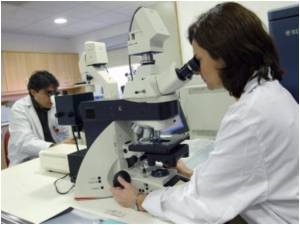
Rett syndrome is an X-linked genetic disease affecting one in 10,000 newborn girls. Infants with the disease appear to develop normally for their first six to 18 months, at which point their movement and language skills begin to deteriorate. Loss of speech, reduced head size, breathing and heart rhythm irregularities, and autistic-like symptoms are common by age four. Some symptoms may be treated with prescription drugs, but no cure or disease-modifying therapy exists. Previous work by the Jaenisch lab has provided some hope for the families of Rett patients. In a mouse model lacking the MECP2 gene, which is mutated in approximately 95% of girls with Rett syndrome, mice injected with the protein IGF-1 had more regular breathing and heart rhythms than did untreated mice. In addition, the brains of treated mice had greater mass and more of the vital neuronal projections that are missing in Rett syndrome mice and human patients.
In the current research, Yun Li, a postdoctoral researcher in the Jaenisch lab, analyzed the global gene expression of MECP2-deficient neurons derived from human embryonic stem cells. Unlike earlier research, Li took into account the Rett neurons'' smaller size when comparing their gene expression to neurons with intact MECP2. The Rett neurons had decreased mRNA transcription, reduced protein synthesis, and severe defects in the AKT/mTOR signaling pathway, which is activated by IGF-1. Li's work is published in the October 2nd issue of Cell Stem Cell.
"We have always found it strange that MECP2 mutant mice, which share many of the severe neurological problems as really sick kids with Rett syndrome, have very few transcriptional changes detectable on a microarray. That doesn't seem to support a global repressor role for the MECP2 protein. There had to be something wrong," says Li. "Now we have a much better understanding of the function of MECP2, and the severity of the disease on a cellular level. Knowing that human Rett neurons are impaired in both global transcription and translation is important for us to design therapeutic strategies for Rett. Growth factors such as BDNF and IGF-1 are known to activate the AKT/mTOR pathway and increase protein synthesis. Down the road, we are interested in further exploring the Akt/mTOR pathway, and investigate how activation of this pathway could reverse the disease."
This work is supported by the Simons Center for the Social Brain, Brain and Behavior Research Foundation, International Rett Syndrome Foundation, Croucher Foundation, Swedish Research Council (VR-B0086301), National Institutes of Health (NIH grants R01-HG002668, P30-CA14051, HD 045022, R37-CA084198), Koch Institute, Curt Marble Cancer Research Fund, Simons Foundation Autism Research Initiative, and Ethel Louise Armstrong Foundation.
Source-Newswise











